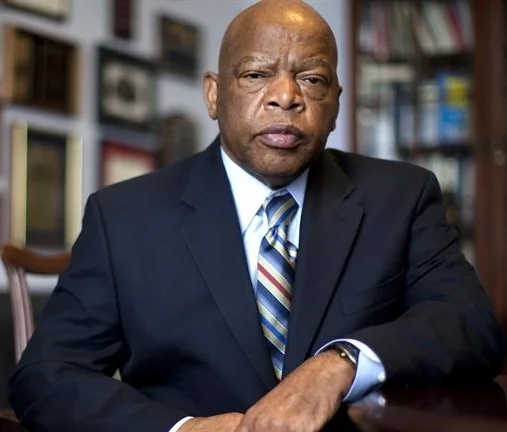John Lewis
Congressman John Robert Lewis 1940 - 2020
February 21, 1940, John Lewis was born in Troy, Alabama to parents who were sharecroppers. He is well-known as an icon and living beacon of hope emerging from the Civil Rights movement. Lewis grew up on his family's farm and had attended segregated public schools during his early years of education. Later he would attend Fisk University from 1960-1964 while making one of the most pivotal decisions of his lifetime to be involved with the Civil Rights Movement.
He had admired the profound and moving words of Dr. Martin Luther King, Jr. who preached about equality and respect for the the rights of Black people. Lewis had watched for years as people in the Black community organized and became inspired by their activism. Especially with the organizing done surrounding the Montgomery Bus Boycott. While Lewis was attending Fisk University he became involved in the civil rights movement by attending trainings and meetings discussing a nonviolent approach to fight back against injustice. He organized sit-ins in Nashville, Tennessee at segregated lunch counters. And from 1963 to 1966 he was the Chairman of the Student Nonviolent Coordinating Committee (SNCC) that he in fact helped form. SNCC would be responsible for organizing multiple sit-ins and voter registration drives in support of the 1965 Selma voting rights campaign.
Lewis was the youngest speaker, then 23 years of age to speak at the March on Washington and is the last remaining speaker to recount the events where Dr. Martin Luther King, Jr. delivered his famous, I Have a Dream speech in 1963. He is one of the 13 original Freedom Riders and one of few still living today to tell the stories of what trials they faced going to and from on the interstate highways of the Deep south.
Although the Civil Rights Act passed in 1965 eliminating legal discrimination and acknowledging that people of color were equal, there would still be a void - voting rights. In response to states, particularly southern states that did not want to allow African Americans to participate in the electoral process by creating barriers for them to register, Lewis and Hosea Williams organized over 600 peaceful marches from Montgomery to Selma. However, on March 7, 1965 a large group of protestors alongside Lewis crossed over the Edmund Pettus Bridge in Selma, Alabama they were beaten and attacked by the Alabama state troopers and laymen enraged with hatred.
These horrific attacks were recorded and shown to the entire nation, known today as “Bloody Sunday”. The images were powerful and so impactful that it took two more peaceful attempts by protesters to successfully cross the bridge in honor of fighting for voting rights. The third attempt of crossing the bridge was a success and resulted in the passing of the 1965 Voting Rights Act.
Lewis has continued for over 50 years to be a pioneer and beacon of hope to many in the community fighting for equality and justice no matter one’s race, gender or sexual orientation. He is a true representation of resilience and tenacity with efforts that provided many of us today with privileges we often take for granted. Years after the civil rights movement he continued to serve in his local community by working for the Voter Education Project and later in 1981, was elected to the Atlanta City Council. To follow in 1986, he was elected to the U.S. House of Representatives to serve the 5th district of Georgia. Congressman Lewis continues to serve in the U.S. House of Representatives today and is one of the most respected leaders among his colleagues while relentlessly fighting for voting rights, education and health reform.
Lastly, he has received one of the highest achievements, the Presidential Medal of Freedom in 2011 by President Obama. And most recently in 2016, he won the National Book Award for one of his graphic novels depicting his work in the Civil Rights Movement, March: Book Three.
























